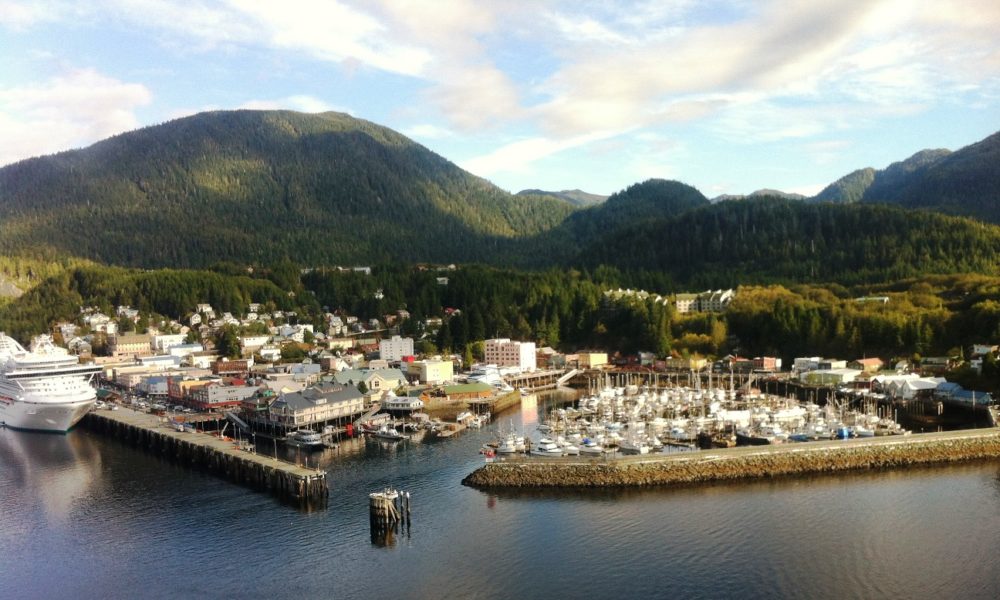
Thomas Basin small boat harbor is seen from the air in 2016. Thomas Basin in one of six beach areas in Ketchikan that recent tests show had high levels of bacteria. (KRBD file photo by Leila Kheiry)
While not an action item on the Ketchikan City Council’s agenda Thursday, water was a recurring topic.
It started during public comment when Gretchen Pikul from the Alaska Department of Environmental Conservation spoke. She was in town for the department’s weekly testing of beach water samples.
DEC this week issued a water-quality advisory for six Ketchikan beaches, due to elevated bacteria levels.
One question from the council was about the source of contamination. Pikul said there are multiple possible sources. They will be testing the bacteria for that, through DNA markers, but that will take time.
“The microbial source tracking DNA markers that we’re going to test for from our Aug. 9th sampling round is dog, gull and human sources,” she said. “That will give us a good idea of how we can track back from the marine environment what possible sources there might be.”
This is the second year of weekly summertime testing. A final report from last year’s tests showed humans were the primary source of bacteria in area ocean water.
Pikul told the council that testing is during the summer only because the grant that pays for the program is limited to when beaches are most commonly used for recreation.
In response to a question about cruise ships, she noted that those ships have a more stringent wastewater treatment process than the community.
“Their treatment systems on board are a tertiary system, so it is far surpassing anything that you have here in town,” she said. “We’ve got primary and secondary here in town, this is tertiary. The system is designed to have zero bacteria coming out, and that’s what we’re seeing.”
City Council Member Dave Kiffer addressed the practice of cruise ships dumping air-system scrubber water into the harbors, which local residents and city officials documented this year.
Assistant City Manager Lacey Simpson responded that the scrubber discharge issue is new, and the state is reviewing it. In the meantime, it’s governed through federal permits.
Also water-related, Ketchikan Public Utilities Electric Division Manager Andy Donato discussed low lake levels at hydroelectric facilities that provide power to Ketchikan. He warned that without rain soon, KPU will need to turn on its backup diesel generators.
The question is when. KPU usually switches to diesel when there are still a couple weeks of hydro available as a backup, in case generators fail. However, the Southeast Alaska Power Agency, which sells wholesale power to Ketchikan, recommends against keeping hydro in reserve.
Donato said he talked with two National Weather Service forecasters who were in Ketchikan this week, and he asked them about the long-range forecast for Ketchikan.
“They told me their crystal ball says we’re going to have warmer than normal temperatures, which is going to be less than normal precipitation,” he said.
Long-range forecasts, though, are not 100-percent reliable. If Ketchikan gets normal or close-to-normal rain in the next three months, Donato said we won’t need diesel. If we don’t get enough rain, it’s going to be a long, expensive diesel burn. For now, though, he says KPU can wait until September.
Also Thursday, the council approved a $2-per-hour pay raise for KPU linemen, and rejected a city health-billing-transparency ordinance. The health-care ordinance was no longer relevant because of a new state law that covers health-care billing.
The council deferred taking action on limiting fireworks within city limits until Sept. 20th, so that Mayor Lew Williams III could be involved in the discussion. Williams was absent Thursday, as was Council Member Judy Zenge.
The next regular city council meeting is Sept. 6th.





